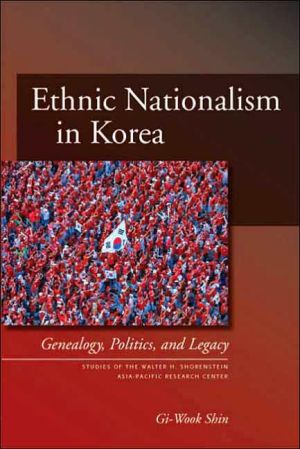

 |

|

The average rating for Ethnic Nationalism in Korea: Genealogy, Politics, and Legacy based on 2 reviews is 4.5 stars.
Review # 1 was written on 2016-09-13 00:00:00 Brent Weiner Brent WeinerHere's why Gi-Wook Shin's Ethnic Nationalism in Korea is a good and fascinating book. Shin's central argument is that the dominant ideology in Korean politics has been, since the beginning of the 20th century, ethnic nationalism. Ethnic nationalism is the idea that the nation ought to be, or is already equivalent to, an ethnicity or race. So what it means to be Korean is a matter of biology: there is supposed to be a common ancestry that Korean people trace themselves back to, an ancestry distinct from all other human beings on the planet. The common ancestor for Korean people is supposed to have been a man named Dangun, some 50000 years ago. An aside here, but a necessary one: Ethnic nationalism is not as uncommon as you might think at first blush. Germany, Italy, and Japan have all at one time claimed ethnic nationalism. So have the English and the Irish. And there are many more examples. Also worth considering is the issue of whether or not there is in fact a common ancestry in these cases or the Korean case. But to arrange a nation it is more or less beside the point, since even if you were somehow to show evidence for a common ancestry it does not follow that you ought to arrange your nation or civic society around that particular group. (I myself don't believe there's any evidence for racial purity and questions of common origin, even in the most mundane cases of trying to find the common origin of the human species in total, are so vague as to be meaningless, hence not worth dealing with. No 'first' homo sapien, let alone German, Italian, etc.) To this latter point regarding how society ought to have organized in Korea, Shin takes a sociological approach. Korean society on both sides of the 38th parallel did shape up in the direction of ethnic nationalism in fact. And Shin argues there was nothing inevitable about the process. Also in Korea at the turn of the 20th century there were all sorts of competing political ideologies which, given some changes one way or the other, could have been different. For example, there was an agrarian utopianism that dates all the way back to the late 19th century, where farmers who fought exorbitant taxes wanted to either collectivize their land or be left alone to decide what to do with surpluses communally. There was an international socialist movement, a Japanese accommodationist movement, a cosmopolitan movement, and on and on. Shin addresses what seems like a contrary argument to his thesis. Again, to restate the thesis, it is that ethnic nationalism is the predominant political ideology in Korea. The counterargument goes that if what Shin says is true, then why do we see such radically different regimes in North and South Korea? Shin argues that what we have in the case of North Korea is a regime that uses anti-imperialism and anti-capitalism as a means to promote ethnic nationalism. Socialist/Communist rhetoric is shaped to promote the idea of a Korean people with a common ancestry, unfortunately divided by imperialist forces. The goal in the North is to make Korea one country again. So it is the goal in the South, only the particular expression of ethnic nationalism is different. In the South, the direction was anti-communist, pro-capitalist. But from Park Chung Hee onward there has been the promotion of the idea that strong economies and liberal democratic societies is what it takes to bring up the Korean nation, where the nation is identified as one people with a common ancestry. None of this is to dispel the very real difference on both sides of the parallel, for instance regarding human rights, quality of life, and other political and economic conditions. But is to say that this ethnic nationalist view is at the core of Korean public and foreign policy. |
Review # 2 was written on 2011-04-22 00:00:00 Jared Sinkowski Jared SinkowskiVery solid overview of Korean nationalism. The first half of the book argues that the development of a strong sense of ethnic nationalism in Korea was not inevitable, but rather a product of the historical interplay of competing ideologies (pan-Asianism, International Socialism, etc). The second half looks at a number of more particular issues (education, agrarianism, minjung, etc). The first half was outstanding - tight, persuasive and interesting. The second half was a bit more rambling, but at times quite interesting. A good place to start learning about Korean nationalism, though I imagine it would be easier going if you had some grounding in 20th century Korean history. |
CAN'T FIND WHAT YOU'RE LOOKING FOR? CLICK HERE!!!